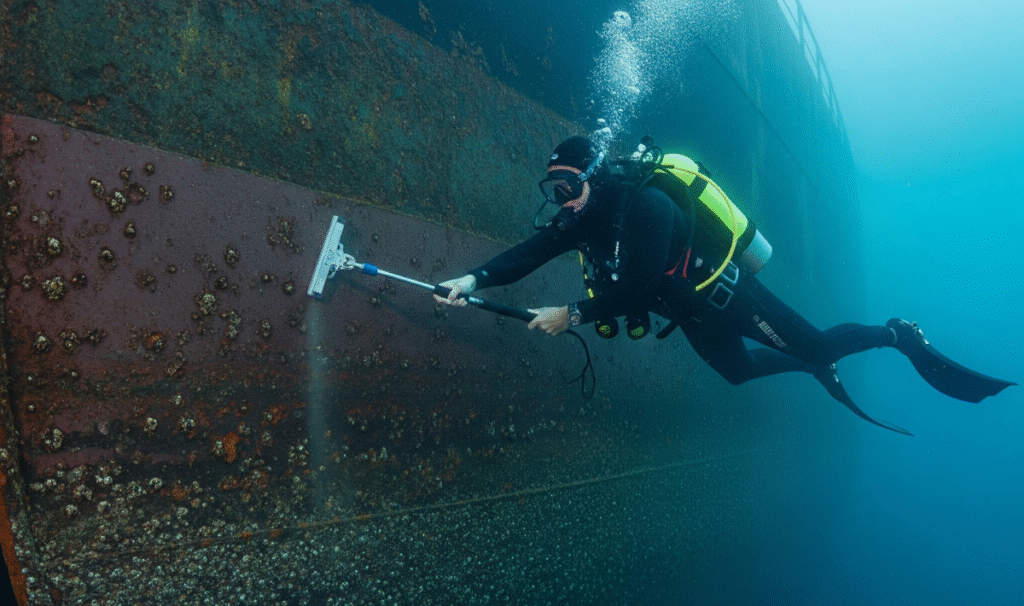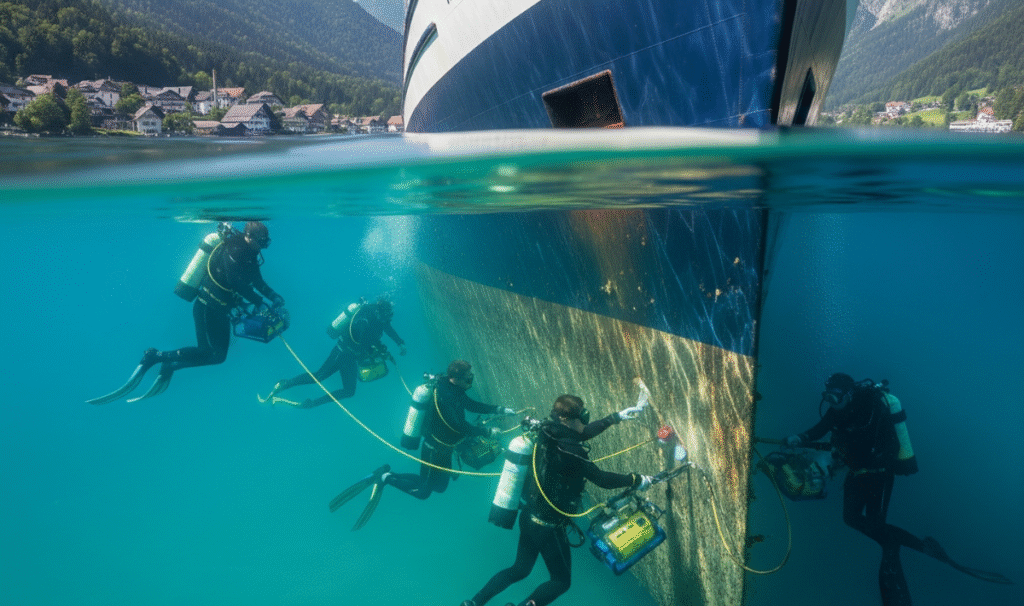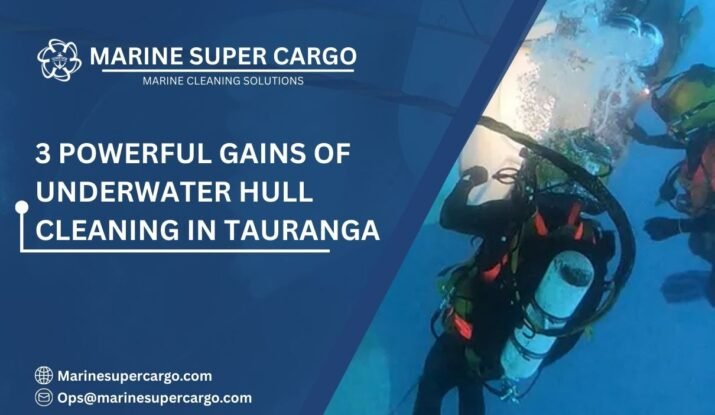Are you ready to unlock the secret to smoother sailing in Tauranga? Underwater hull cleaning in Tauranga is not only about keeping your boat pristine but also about optimizing fuel use, safeguarding performance, and protecting the Bay of Plenty’s cherished marine environment. Imagine your hull as your vessel’s running shoe—caked in muck, every step is a drag; polished and clean, you glide effortlessly across the water. Let’s explore why underwater hull cleaning matters, how it’s done, and how to get the most value from this essential service in Tauranga.
Why Underwater Hull Cleaning in Tauranga Matters
Boating isn’t just a pastime in Tauranga—it’s a lifestyle, a livelihood, and sometimes a race to the finish line. But beneath the glittering blue, your hull fights a constant battle with marine growth—algae, barnacles, slime, and even invasive pests. If left unchecked, this “biofouling” can slow you down by up to 25%, hike up your fuel costs, risk the health of your boat, and even endanger local ecosystems. Clean hulls mean more fun, faster trips, lower bills, and peace of mind.
The Unique Marine Environment of Underwater Hull Cleaning in Tauranga and Its Biofouling Challenges
Tauranga’s pristine coastal waters, influenced by tidal flows and moderate temperatures, create a fertile breeding ground for marine organisms. Warm summers and abundant sunlight encourage barnacles, mussels, and slime to take up residence in record time. Even a few weeks at anchor can lead to dramatic growth and a surprising drag on your vessel’s performance. For this reason, underwater hull cleaning in Tauranga is a regular necessity, not a luxury.

Risks of Neglecting Hull Maintenance
What if you let the barnacles win? It’s like running a marathon with bricks tied to your ankles. Expect:
- Lost speed and sluggishness: Drag can dramatically slow travel and reduce fuel efficiency.
- Skyrocketing fuel bills: More drag means more power needed for the same speed—even a thin layer can increase fuel use by up to 25%.
- Damage to protective coatings: Organisms eat through anti-foul paints and expose your hull to corrosion.
- Regulatory headaches: Local and national laws require clean hulls to limit the spread of invasive species.
- Hidden hazards: Growth can block intakes, sensors, or even damage propellers.
Responsible maintenance supports not only performance but also compliance with global port standards such as those promoted by the International Association of Ports and Harbors (IAPH).
The Underwater Hull Cleaning Process in Tauranga
Professional underwater hull cleaning combines smart planning, technology, and environmental awareness.
Dive Safety and Site Preparation
Certified divers prepare by reviewing water conditions, tides, vessel movement, and local traffic. They conduct gear checks, surface safety sweeps, and ensure there’s no risk to themselves or the environment. In Tauranga’s busy marinas, safety is always the first port of call.
Modern Tools, Cleaning Methods, and Technology
Tauranga cleaning pros use:
Rotary brushes and soft scrapers for biofouling removal.
Underwater cameras or ROVs for hull inspections and post-clean documentation.
Suction and debris containment systems are used to avoid polluting local waters.
Eco-friendly cleaning agents and non-abrasive methods for delicate hull coatings.
Some services use dry soda blasting when the vessel is hauled out—it’s fast, non-destructive, cost-effective, and helps prevent barrier coat damage.
Choosing a Professional Hull Cleaning Service in Tauranga
With so many boats in Tauranga, competition for quality services is high. Don’t settle—select a team that ticks all the boxes.
Certifications, Experience, and MPI Compliance
Choose providers with:
Certified, insured commercial divers.
Proven success in local conditions and references from Tauranga marinas.
Full compliance with MPI (Ministry for Primary Industries) biosecurity and environmental standards.
The use of debris containment and eco-friendly products.
How Often Should You Clean Your Hull in Tauranga?
Depending on your vessel’s activity and local fouling rates, most boat owners schedule cleaning every one to three months. More frequent cleans may be needed during peak fouling seasons or for boats that spend long periods idle. Proactive maintenance stops issues before they start and prevents small fouling from becoming a major repair.
Environmental Regulations and Safe Hull Cleaning Practices
Bay of Plenty Regional Council and MPI regulations require you to keep contaminants like marine pests, anti-foul, and cleaning debris out of the water. Cleaning is best done in approved haul-out facilities that provide containment and proper disposal, but in-water hull cleaning is also permitted if strict protocols are followed. Reporting sightings of invasive species and using approved methods protects both your boat and Tauranga’s vibrant sea life.
For international compliance, cleaning practices should also align with the IMO biofouling guidelines, ensuring sustainable operations and protection of marine ecosystems.
What Does Hull Cleaning Cost in Tauranga?
Rates for underwater hull cleaning in Tauranga generally vary with vessel size, fouling severity, and service complexity. As of late 2023, expect to pay around NZD 10 per foot for in-water cleaning. Soda blasting and comprehensive hull restoration for larger vessels may cost more but pay dividends with longer-lasting coatings and better performance. Regular underwater hull maintenance minimizes the need for expensive full-strips or barrier coat repairs.
DIY vs. Professional Hull Cleaning: Pros and Cons
Tempted to suit up and do it yourself? While topside cleaning is fine for the enthusiast, underwater hull cleaning in Tauranga is best left to the professionals:
- Pros: Safer, more thorough, environmentally compliant, and guaranteed not to damage coatings.
- Cons: DIY risks injury, legal penalties, and the potential for unintentional environmental harm.
Professionals offer detailed inspection reports, video evidence, and maintenance suggestions, giving you peace of mind with every clean. Plus, they ensure compliance with global maritime regulations like MARPOL, which prohibits the disposal of harmful waste into the sea.
Benefits of Regular Cleaning: Savings, Speed, Longevity
Staying on top of hull cleaning brings:
Fuel savings up to 25% due to less drag and smoother sailing.
Faster trips and tighter maneuverability on the water.
Longer lifespan for antifoul coatings and bare hulls.
Early detection of mechanical or hull problems avoids costly repairs.
Full legal compliance and support for Tauranga’s environmental health.

Real Experiences from Tauranga’s Boating Community
Local boat owners rave about the immediate difference a clean hull makes: “It honestly feels like the boat’s lost a ton in weight,” says one yacht skipper after a professional clean. A commercial operator reported catching a faulty propeller anode during an underwater scrub—solving a problem before it turned into an emergency. For Tauranga’s competitive regatta teams, a clean hull has proven to be the secret weapon for podium finishes.
Conclusion:
Underwater hull cleaning in Tauranga is more than just another maintenance chore—it’s a commitment to performance, safety, compliance, and the pride of knowing your boat is ready for anything. By partnering with certified local experts, following a tailored cleaning schedule, and respecting New Zealand’s environmental rules, you set sail with a faster, safer, and more cost-efficient vessel every time. Let’s keep Tauranga’s waters clean, your hulls slick, and your adventures limitless.
FAQ:
Q1. How often should I book underwater hull cleaning in Tauranga?
Most vessels benefit from cleaning every 1 to 3 months, but frequency depends on how often you use your boat and the rate of local fouling.
Q2. Are there special environmental rules for hull cleaning in Tauranga?
Yes—cleaning must avoid releasing contaminants or marine pests into local waters, and proper debris containment is required by Bay of Plenty regulations. Use only approved methods and report any invasive species.
Q3. What does underwater hull cleaning typically cost in Tauranga?
Expect to pay about NZD 10 per foot for standard in-water cleaning. Costs vary with vessel size, fouling levels, and chosen service type.
Q4. Is soda blasting better than traditional hull cleaning?
Soda blasting is faster, gentler, and more cost-effective for deep cleans and antifoul removal, reducing the risk of damaging protective coatings.
Q5. Why should I hire a professional for underwater hull cleaning?
Professionals guarantee safety, biosecurity compliance, advanced tools, complete debris containment, and thorough cleaning, helping you avoid legal penalties and performance loss.


